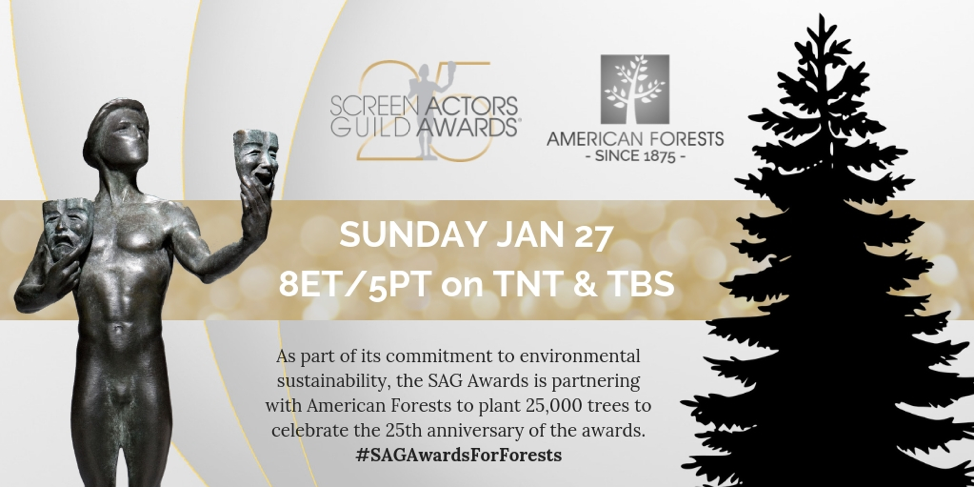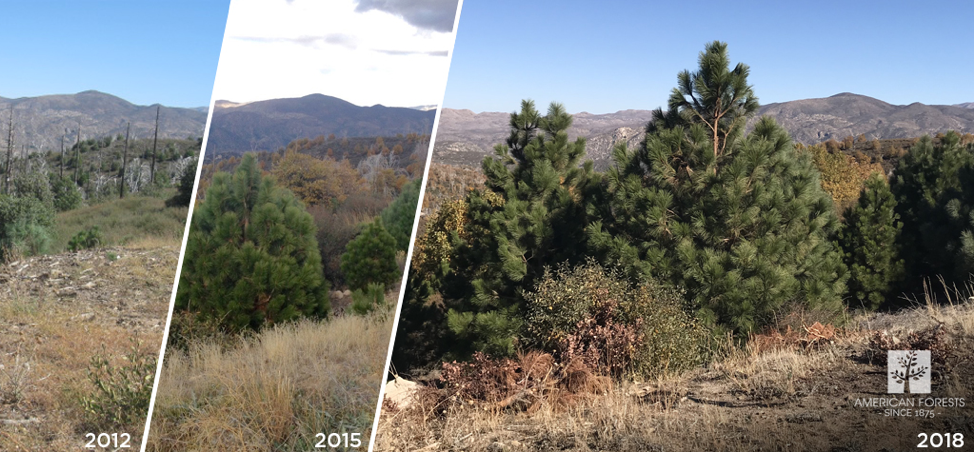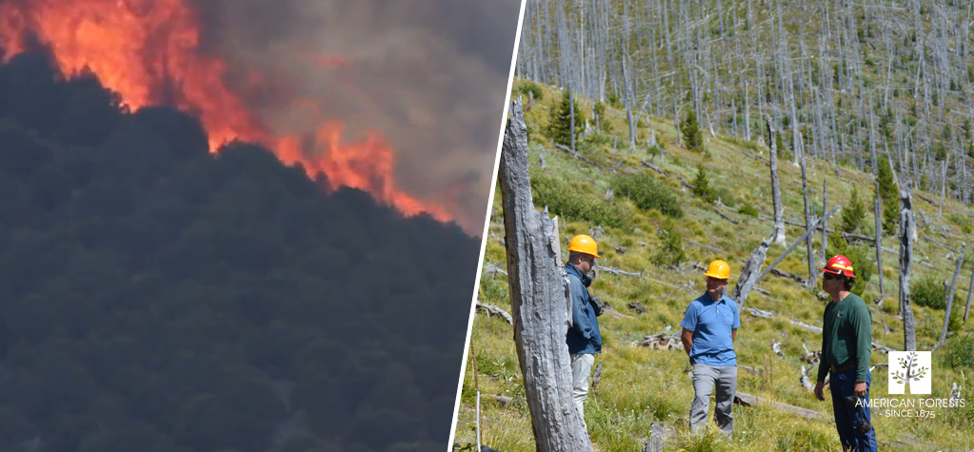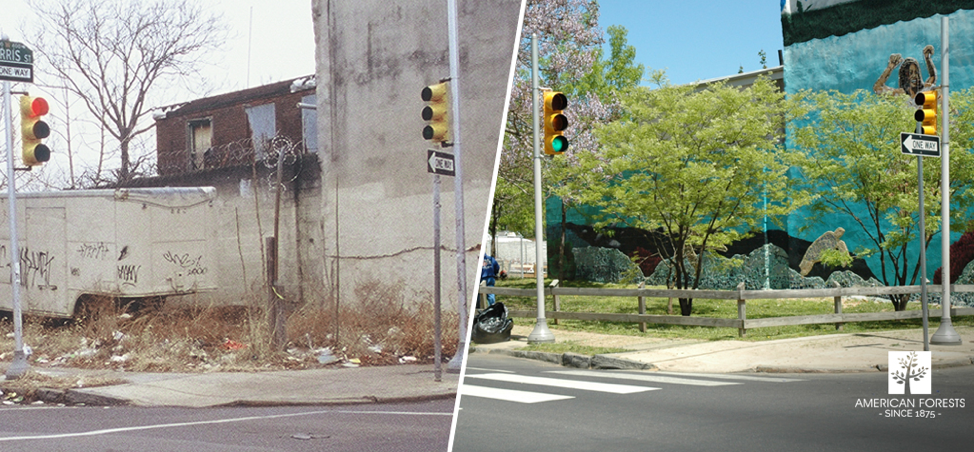American Forests

AMERICAN FORESTS AND THE SAG AWARDS PARTNERSHIP
This year, the Screen Actors Guild Awards®, as part of its commitment to sustainable practices, is again partnering with nonprofit conservation organization American Forests, which is saluting the SAG Awards’ Silver Anniversary by providing 1,000 trees for each of the ceremony’s 25 years. These 25,000 trees will be planted this year in locations across the United States and will benefit the climate and people by improving the quality of air, water and wildlife habitat.
The two organizations first joined forces in 2017 when American Forests planted 1,250 trees—one for each of that year’s SAG Awards’ attendees—in the fire-damaged Angeles National Forest. “This year the SAG Awards is proud to be joining with American Forests once again to make a positive impact on the world we all share,” said Kathy Connell, SAG Awards® Executive Producer. “We welcome this opportunity to help offset the carbon footprint of the 25th SAG Awards production. The devastation wreaked by the recent tragic fires is a timely reminder of how important it is to be good guardians of our environment. Trees, like the art of acting, sustain and inspire us.”
Jad Daley, President & CEO of American Forests, said, “We are pleased to expand our relationship with the SAG Awards and to be part of their 25th Anniversary show. American Forests is honored to partner with the SAG Awards to bring attention to the growing climate crisis, and the role that healthy, resilient forests can play in slowing climate change and protecting our communities. Together we will replant trees on forestlands damaged by climate change, using tree species selected to maximize natural carbon capture and resilience to climate threats like wildfire.”
The Why and Where of These Trees

From climate change and equity to biodiversity and water availability, forests are at the center of our most important environmental challenges.
The trees planted through the partnership between the SAG Awards and American Forests will be species native to the ecology of their new home.
- California
- 2,500 Jeffrey pine (Pinus jeffrey) ponderosa pine (Pinus ponderosa)
- Forest Lawn Boy Scout Reservation, San Bernardino County
- California’s native forests face unprecedented threats from intense fires, drought and pests. This project is an ongoing demonstration of scientifically developed strategies to repair damage and to develop forests that are more resilient to changes in climate.
- Michigan
- 12,500 jack pine (Pinus banksiana) and red pine (Pinus resinosa)
- State-owned land, Northern Lower Peninsula, Foster Township, Ogemaw County
- These forests are a unique habitat type, essential to diverse flora and fauna including the endangered Kirtland’s warbler. This project preserves existing habitat and supports the habitat’s northward shift due to climate change.
- Montana
- 2,500 whitebark pine (Pinus albicaulis)
- Beaverhead-Deerlodge National Forest, Madison Ranger District, at the headwaters of the Ruby River in Madison County
- This project provides protection, scientific development and educational programs addressing high-elevation pines, which are under substantial attack from pest infestations, fatal diseases and intense wildfires. All of which are fueled by climate change.
- South Carolina
- 5,000 longleaf pine (Pinus palustris)
- James W. Webb Wildlife Management Area
- Palachucola Wildlife Management Area, Manchester State Forest. Hampton County, Sumter County
- Less than 3 percent of longleaf pine remains in its historical range. This project is helping bring back these biologically rich forests, to create intact habitat areas for iconic wildlife like the red-cockaded woodpecker and gopher tortoise.
- Texas
- 2,500 thornscrub trees, like Texas ebony (Ebenopsis ebano)
- Laguna Atascosa National Wildlife Refuge, Willacy County
- One of the most biodiverse areas in North America, the Texas thornscrub ecosystem has been fragmented by agricultural use and rapid development. This project will help restore critical habitat for migratory birds and butterflies, as well as for endangered mammals like the ocelot.
American Forests’ mission is to create healthy and resilient forests from cities to wilderness, in order to deliver essential benefits to climate, people, water and wildlife. Founded in 1875, American Forests is the oldest national nonprofit conservation organization in the U.S., and has been a catalyst for many key national forest milestones, policies and practices, from the founding of the U.S. Forest Service and the National Forest System to public education efforts. Since 1990, we have planted more than 60 million trees in all 50 states and nearly 50 countries. These projects have restored many thousands of acres of wildlife habitat, protected vital watersheds and sequestered millions of tons of carbon and greenhouse gases. American Forests is also one of the nation’s leaders in expanding greenspace in cities and leading urban forest initiatives that transform underserved communities across the country.
American Forests’ American ReLeaf program
The American ReLeaf program is driven by one unifying goal: to restore North America’s native forest landscapes to full health and long-term resilience.
American Forests is focused on eight priority threatened forest landscapes, where we are revitalizing whole ecosystems that are essential to people, wildlife and climate, from mountain ranges to watersheds.
Millions of acres of forest have been lost or degraded by extreme wildfire and pest infestations, as well as human actions like mining and sprawling development.
Climate change, the most profound threat our forests have ever faced, is exacerbating these stresses and weakening forests that simply cannot adapt fast enough.
Bringing a forest back to health requires more than just planting trees. In each area we work, we employ our five-step impact model to achieve lasting forest recovery. Our approach includes: building partnerships with agencies, industry and scientists to integrate climate science into forest restoration; developing conservation plans to ensure success and direct resources to the most important places; and restoring forests using tried and true as well as cutting edge strategies.
American Forests’ Community ReLeaf program

American Forests is committed to building vibrant cities through urban forests and greenspace.
From ensuring equitable distribution of tree canopy to creating much-needed green jobs, we are working with our diverse partners and stakeholders in every sector to help bring Tree Equity to communities across the U.S. We work to ensure all people in cities and towns can receive the many benefits trees provide.
Urban trees provide critical services for our cities every day likeproducing oxygen, absorbing carbon dioxide and other greenhouse gases, filtering air pollution, intercepting rainfall to protect urban water, and keeping cities cooler on hot summer days – all of which help improve the health of residents.
Through our five-step Impact Model designed to drive community empowerment, our work is informed by complementary strategies:
In our place-based work in more than 20 cities, we empower local stakeholders to address gaps in canopy coverage and tree-maintenance support through technical expertise, grants, and planning partnerships.
On a national level, we are developing a toolkit for workforce development in urban forestry, and helping to create place-based green-job pilot programs, including tree nurseries to supply low-cost urban trees for cities’ tree restoration needs, and urban wood re-use programs to utilize trees that need to be taken down for products from lumber to home furnishings and more.
We are also helping to foster a national movement by sharing best practices among partner cities, creating tools like Vibrant Cities Lab that anyone can use, and promoting policy initiatives in support of urban forests.
Learn more about the work of American Forests at www.americanforests.org.
CONTACT:
Michael Woestehoff, Director of Communications, mwoestehoff@americanforests.org. 202-507-3043














